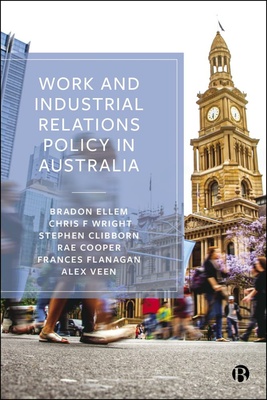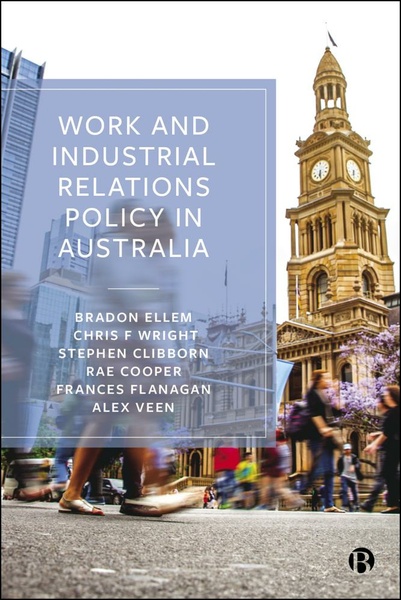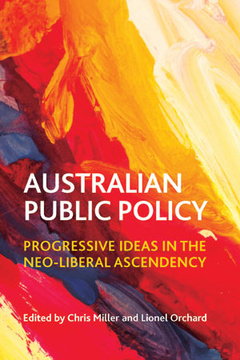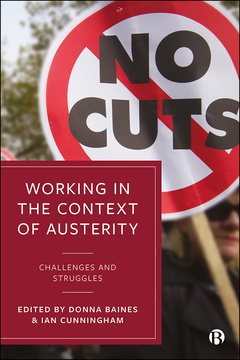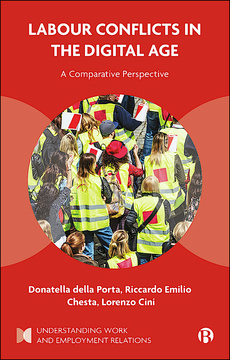Work and Industrial Relations Policy in Australia
By Bradon Ellem, Chris F. Wright, Stephen Clibborn, Rae Cooper, Frances Flanagan and Alex Veen
Published
May 1, 2025Page count
224 pagesISBN
978-1529239065Dimensions
234 x 156 mmImprint
Bristol University PressPublished
May 1, 2025Page count
224 pagesISBN
978-1529239058Dimensions
234 x 156 mmImprint
Bristol University PressPublished
May 1, 2025Page count
224 pagesISBN
978-1529239072Dimensions
234 x 156 mmImprint
Bristol University PressThis book provides a comprehensive analysis of the institutions and processes shaping work, labour markets and industrial relations policies in Australia.
It explores traditional industrial relations issues and examines social change and policy failures, in areas such as gender, work and family dynamics, skills and immigration and wage theft. Additionally, it considers how pandemics, climate change, technological advances and new business forms impact policy change. Addressing these universal challenges, the book offers fresh conceptual approaches and rethinks policy problems and solutions.
Essential reading for scholars, students, and practitioners, this book reshapes our understanding of work and industrial relations policy.
“This is a valuable contribution from leading Australian thinkers about work today and the role of the state in shaping it. It closely analyses the impact on work of societal trends and how recent changes to workplace law have sought to respond. I commend this book to all who are interested in how the state can influence the world of work - for better or for worse.” Senator The Honourable Murray Watt, Australian Minister for Employment and Workplace Relations.
“Path-breaking books often perform a task that, one is surprised, was never addressed before. This innovative volume examines how the Australian state regulates its labour market and provides a surprise of just this kind. It presents a novel analysis of the different methods the state in Australia has used to regulate trade unionism, gender relations, productivity, migration, and precarious forms of work, foregrounding the state as an industrial relations actor in a manner that has not been attempted before. The book is a great success. With luck, it will inspire non-Australians to develop similar analyses for their own countries.” Edmund Heery, Cardiff University
“Work and Industrial Relations Policy in Australia is an extremely thorough, modern, and forward-looking analysis of how public policy regulates and helps shape work. The authors provide a rich historical analysis of conventional industrial relations policies and incorporate contemporary issues of gender equity, climate change, gig work, immigration, and worker voice. In doing so the book is both a valuable resource for students, practitioners, policymakers, and academics in Australia and a model for those who might undertake similar analyses in other countries. Hopefully, their international peers will follow suit.” Thomas A. Kochan, MIT Sloan School of Management and Institute for Work and Employment Research
“At last, a whole book devoted to industrial relations public policy in Australia and its implications for the rest of the world. It’s written by a team of fine scholars, and it covers a wide range of policy topics. It doesn’t get much better than this.” Mark Bray, University of Newcastle (Australia)
“This illuminating and superbly researched book provides a compelling and innovative narrative about what governments do to regulate work. It explores the changing contest of ideas behind key employment policies in Australia with a welcome emphasis on their suitability for addressing today’s major challenges of providing a secure and resilient environment for all modes of paid work, in light of current social, environmental and technological transformations. It provides a wealth of lessons for employment policy and practice in other developed countries and should inspire scholars, students and policy makers with its ideas about how to regulate more effectively for more decent work.” Damian Grimshaw, King’s College London
“The absence of a single volume focused upon industrial relations policy in Australia is a longstanding and vital gap that this book finally, and superbly, fills. Written by a team of scholars, each of whom are leading authorities in the field, the book takes the centrality of the state in the regulation of industrial relations as its subject as it addresses both the contemporary framework of regulation and a set of pressing issues facing work and industrial relations, including the gig economy, climate change and migration.” Chris Howell, Yale-NUS College and Oberlin College
“A leading group of scholars brings a fresh approach to understanding the impact of the state on work and labour markets. This account takes a broad view of industrial relations policy, be it long-established problems around worker representation, collective bargaining, insecure work and gender equality or fresh ones including gig work, climate change and underpayment. It is destined to become a landmark study and is an essential text for labour economists, industrial relations specialists, researchers and policy makers alike.” Alison Preston, University of Western Australia
“This book, coauthored by leading Australian industrial relations scholars, is a timely one for all concerned with the world of work. It focuses on key contemporary challenges to, and prospects for, decent work through locating the ‘doing’ of industrial relations in an analysis of the role of the state in employment. This analysis pays close attention not only to the impact of the regulatory architecture of employment but also its highly contested politics and intersections with other areas of state policy such as on migration and climate change, carefully documenting policy successes, failures and blind spots.” Sara Charlesworth, RMIT University
“This book gives a uniquely comprehensive account of Australian industrial relations – from the first national industrial relations policy in 1904 to the Fair Work Act 2009 to major amendments in 2022 under the Albanese government. It should be read widely, both for its insights on work and employment in Australia and for its broader lessons on the role of the state in shaping power relations between workers and their employers. The authors show that good policy encouraging fair and decent work is ultimately underpinned by a strong labour movement capable of promoting and enforcing reforms that balance equity, efficiency, and voice.” Virginia Doellgast, Cornell University
A leading group of scholars brings a fresh approach to understanding the impact of the state on work and labour markets. This account takes a broad view of industrial relations policy, be it long-established problems around worker representation, collective bargaining, insecure work and gender equality or fresh ones including gig work, climate change and underpayment. It is destined to become a landmark study and is an essential text for labour economists, industrial relations specialists, researchers and policy makers alike.” Alison Preston, University of Western Australia
“A masterful book by a powerhouse team of scholars. Work and Industrial Relations Policy in Australia deftly balances an insightful conceptual framework that doesn’t marginalize gender and race, with rich coverage of traditional and emerging policy topics. Students will gain a deep understanding of Australian labour policy while scholars should use this stimulating book as a model for analyzing other settings. Read it as if the future of labour policy depended on it, because it does.” John W. Budd, University of Minnesota
“In a clear and well-structured way this book persuasively shows us the pivotal role of the state in shaping the regulation of work. Changes in technology, global trade, demography, migration, etc. matter. Still, policy choices are decisive for the regulation of work. This book is a unique and rich up to date analysis of Australian industrial relations that deserves a broad audience.” Soren Kaj Andersen, University of Copenhagen
“Although the legislation overlaying the industrial relations system in Australia has been relatively stable from 2009-2022, this book shows that the regulation of work itself underwent considerable change in the same period. The authors insightfully examine the factors driving these changes to illuminate their impacts on working people in Australia and beyond where similar forces prevail. Scholars, policy makers and the interested public have much to learn from this terrific book written by leading lights of the field.” David Weil, Brandeis University
“This book on the role of the state in Australian industrial relations by a very informed and insightful group of authors breaks new ground by extending the lens on the role of the state in industrial relations to new areas and challenges from gender equality to the green transition and the growth of platforms. Also importantly it treats the impact of the state as central in all areas so that neglect by the state is as much evidence of its role in shaping outcomes as when more positive policies are enacted. Definitely worth a read by all scholars of industrial relations.” Jill Rubery, University of Manchester
Bradon Ellem is a Professor of Employment Relations at the University of Sydney.
Chris F. Wright is Professor of Work and Labour Market Policy at the University of Sydney.
Stephen Clibborn is Associate Professor of Work and Organisational Studies at the University of Sydney.
Rae Cooper is Professor of Gender, Work and Employment Relations at the University of Sydney.
Frances Flanagan is Lecturer in Law at the University of Technology Sydney.
Alex Veen is Senior Lecturer in Work and Organisational Studies at the University of Sydney.
1. Introducing Industrial Relations Policy
2. Understanding Work, the State and Policy
3. Policy in Australia: Origins, Change and Legacies
4. The Fair Work Policy Framework
5. Voice: Worker Representation and Collective Bargaining
6. Equity: Gender and Work
7. Efficiency: The Productivity Debate
8. Skills and Immigration: Addressing Workforce Supply and Demand
9. Policy Failure: Underpayment and Insecure Work
10. Policy Subversion: The Gig Work Problem
11. The Climate Crisis and Industrial Relations
12. Assessing Australian Industrial Relations Policy







